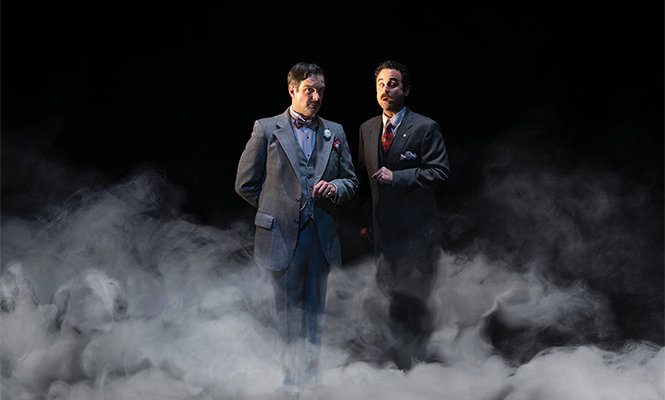Theater Preview: Pioneer Theatre Company's Murder on the Orient Express
The unique challenges of staging a whodunnit, if people already know whodunnit
By Scott Renshaw @scottrenshawWith its season-opening production, Pioneer Theatre Company is offering Murder on the Orient Express, based on the 1934 Agatha Christie novel featuring master detective Hercule Poirot. It is a mystery, yet it's based on a nearly-century-old source material, one that has received two film adaptations, including one just six years ago. As such, it presents an intriguing challenge to a creative team: How do you tell a whodunnit, when a significant portion of your audience probably already knows whodunnit?
For director Melissa Rain Anderson, who is overseeing PTC's production, there are several answers to that question, all built around the idea that there's so much more to the genre than the naming of the murderer. And many of them, for her, are based on the unique ways that mystery plays out on a stage compared to on a screen.
"I actually think the stage is a perfect platform to sort of keep the pressure on," Anderson says. "We can't do a close-up; it's pretty much always a 'wide shot.' So that intense pressure that needs to build up is really fun to work on. ... We talk a lot about 'keeping the lid on the pot.'"
A big part of that "pressure maintenance," according to Anderson, comes from the rhythms of dialogue and its pacing. "The language is so important," she says. "If we keep the language at healthy tempo, living in that heightened space of style, it raises the stakes immediately—when we decide to stop, and a penny drops for Poirot, or any of the characters. When the rhythm is off, we can feel it; we can feel that the heart-rate has changed."
Performance is key in a story that is in some ways about which characters are "performing" their innocence, and Anderson talks a lot about how to steer those performances so they are compelling to watch, even if you already think you know who's lying, and when.
"The actors have been great about knowing that specificity of ... who can let something kind of catch them off guard, and to what degree. Someone may know something, so we're not trying to give away too much, and too soon. It's about what to give away when, when people know things. ... If you have a mask on [as a character], the pressure of hiding, it oozes out of the mask-holes every once in a while, then oozes back in. ... That is part of the fun: The audience going, 'Oh, it's him! Oh, it's her! Oh, it's him!'"
While the nuances of watching the actors can make for a wonderful experience, there can also be a sense of discovery in this Murder on the Orient Express simply by virtue of it being a new adaptation, with a more contemporary perspective. Ken Ludwig's 2017 version was commissioned by the Agatha Christie estate, and it makes some changes to the lineup of suspects, including combining some characters and changing the gender of others to add more female energy. Anderson added to this in her casting of actor John Tufts as Poirot, shifting the notion of the detective from an older veteran to someone younger.
"I didn't cast a Poirot that you might see as a typical Poirot," Anderson says. "He's not the 'type;' he's not David Suchet [who starred in the long-running British TV series about Poirot]. But I think if you have a really good actor, and you want to hire them for a role, I think looking to a younger person can be the way to go."
Even the simple fact of the narrative's setting—on a passenger train—can provide a unique experience for an audience, and a unique challenge for a theatrical artist. "[The story] takes place in a day-and-a-half. And trains are small. There's time pressure, but there's also space pressure. The cars move. That's been fun trying to figure that out."
All of these things can be true, yet there's also a baseline reality—emphasized by the culture of online "spoiler warnings"—that a lot of people experience plays, books and movies wanting to be surprised by what happens next. Anderson contends that while, yes, a mystery is very much about the plot, it's also about the experience of watching that plot unfold.
"I do think that there are enough nuances woven into the play that even if you do know, you're likely to be captivated by the small little red herrings, the twists that the play takes to get to the end," Anderson says. "Even if you know what happens, you're watching Poirot figure it out. With a mystery, we're following the breadcrumbs with the detective.
"For me, knowing how it works out doesn't really spoil the journey that you're on. You can relinquish yourself in that journey. How things are uncovered—and how they're covered up—is part of this journey. That can be just as exciting: how people are lying and deceiving."
More by Scott Renshaw
-
Film Reviews: New Releases for May 17
IF, Back to Black, I Saw the TV Glow, Evil Does Not Exist
- May 16, 2024
-
Film Reviews: New Releases for May 10
Kingdom of the Planet of the Apes, We Grown Now, Force of Nature: The Dry 2, Nowhere Special and more
- May 9, 2024
-
Feature movie review: WE GROWN NOW
Period-piece drama finds quiet power in how hard it is to keep kids safe
- May 8, 2024
- More »
Latest in Arts & Entertainment
Readers also liked…
-
New TV for January 2023
Mayfair Witches, Velma, The Last of Us, Poker Face and more premieres
- Jan 4, 2023




